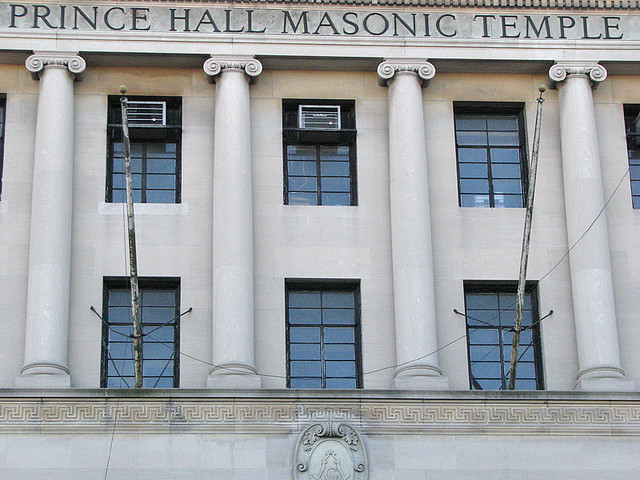En:Prince Hall

Inhaltsverzeichnis
Prince Hall
Prince Hall Freemasonry Source: Wikipedia
Prince Hall Freemasonry derives from historical events in the early United States that led to a tradition of separate, predominantly African-American Freemasonry in North America.
In 1775, an African-American named Prince Hall[19] was initiated into an Irish Constitution military Lodge then in Boston, Massachusetts, along with fourteen other African-Americans, all of whom were free-born. When the military Lodge left North America, those fifteen men were given the authority to meet as a Lodge, form Processions on the days of the Saints John, and conduct Masonic funerals, but not to confer degrees, nor to do other Masonic work. In 1784, these individuals applied for, and obtained, a Lodge Warrant from the Premier Grand Lodge of England (GLE) and formed African Lodge, Number 459. When the UGLE was formed in 1813, all U.S.-based Lodges were stricken from their rolls – due largely to the War of 1812. Thus, separated from both UGLE and any concordantly recognised U.S. Grand Lodge, African Lodge re-titled itself as the African Lodge, Number 1 – and became a de facto "Grand Lodge" (this Lodge is not to be confused with the various Grand Lodges on the Continent of Africa). As with the rest of U.S. Freemasonry, Prince Hall Freemasonry soon grew and organised on a Grand Lodge system for each state.
Widespread segregation in 19th- and early 20th-century North America made it difficult for African-Americans to join Lodges outside of Prince Hall jurisdictions – and impossible for inter-jurisdiction recognition between the parallel U.S. Masonic authorities.
Prince Hall Masonry has always been regular in all respects except constitutional separation, and this separation has diminished in recent years. At present, Prince Hall Grand Lodges are recognised by some UGLE Concordant Grand Lodges and not by others, but they appear to be working toward full recognition, with UGLE granting at least some degree of recognition.[20] There are a growing number of both Prince Hall Lodges and non-Prince Hall Lodges that have ethnically diverse membership.
History
On March 6, 1775, an African American named Prince Hall was made a Master Mason in Irish Constitution Military Lodge No. 441, along with fourteen other African Americans: Cyrus Johnston, Bueston Slinger, Prince Rees, John Canton, Peter Freeman, Benjamin Tiler, Duff Ruform, Thomas Santerson, Prince Rayden, Cato Speain, Boston Smith, Peter Best, Forten Horward, and Richard Titley, all of whom apparently were free by birth. When the Military Lodge left the area, the African Americans were given the authority to meet as a Lodge, form Processions on the days of the Saints John, and conduct Masonic funerals, but not to confer degrees nor to do other Masonic work. These individuals applied for and obtained a Warrant for Charter from the Grand Lodge of England in 1784 and formed African Lodge #459.
Despite being stricken from the rolls (like all American Grand Lodges were after the 1813 merger of the Antients and the Moderns), the Lodge restyled itself as African Lodge #1 (not to be confused with the various Grand Lodges on the Continent of Africa), and separated itself from United Grand Lodge of England-recognized Masonry. This led to a tradition of separate, predominantly African American jurisdictions in North America, which are known collectively as Prince Hall Freemasonry. Widespread racism and segregation in North America made it impossible for African Americans to join many mainstream lodges, and many mainstream Grand Lodges in North America refused to recognize as legitimate the Prince Hall Lodges and Prince Hall Masons in their territory.
For many years both Prince Hall and "mainstream" Grand Lodges have had integrated membership, though in some Southern states this has been policy but not practice. Today, Prince Hall Lodges are recognized by the Grand Lodge of England (UGLE) as well as the great majority of state Grand Lodges in the US and many international Grand Lodges. While no Grand Lodge of any kind is universally recognized, at present, Prince Hall Masonry is recognized by some UGLE-recognized Grand Lodges and not by others, but appears to be working its way toward further recognition.[2] According to data compiled in 2008, 41 out of the 51 mainstream US Grand Lodges recognize Prince Hall Grand Lodges.
Notable members
There are many notable Masons who were affiliated with Prince Hall originated Grand Lodges.
Among the first Grand Masters, Prince Hall African Lodge #459:
- Prince Hall, Boston, Massachusetts, Grand Master 1791-1807
- Nero Prince, Boston, Massachusetts, Grand Master 1808
- George Middleton, Boston, Massachusetts, Grand Master 1809-1810. Commander, Bucks of America, a unit of black soldiers during the American Revolution. The unit received a flag from Governor John Hancock for its faithful service. Middleton was also a founder of the African Benevolent Society.
- Peter Lew, Dracut, Massachusetts, Grand Master 1811-1816, son of Barzillai Lew
- Sampson H. Moody, Grand Master 1817-1825
- John T. Hilton, Grand Master 1826-1827
- Walker Lewis, Lowell, Massachusetts, Grand Master 1829-1830
- Thomas Dalton, Boston, Massachusetts, Grand Master 1831-1832, son-in-law of Barzillai Lew
Videos
<videoflash>x5Ktk0f5oSk</videoflash>
Source: youtube.de
